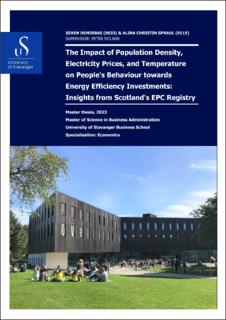| dc.description.abstract | Climate change affects us all, so it is crucial to prioritise efforts to mitigate its impact. Improving building energy efficiency is a cost-effective solution to reduce CO2 emissions, which has significant influence on climate change. Our study examines how external factors, specifically population density, temperature, and energy prices, influence people's behaviour towards investing in energy efficiency. By using multiple linear regression, we analyse these variables against the Energy Performance Certificate (EPC) rating of dwellings in Scotland to understand people's decision-making. Our results show that higher population density is positively associated with energy performance rating, indicating greater energy efficiency in densely populated areas. Additionally, low temperature also positively influences energy performance rating, most likely driven by people's desire for comfort, cost savings from energy efficiency upgrades, and improved heat retention through house insulation. Regarding energy prices, we observed a mixed relationship depending on the type of energy fuel. Overall, our research demonstrates that external factors have an impact on energy performance rating, i.e., on people's decisions towards energy efficiency. | |
